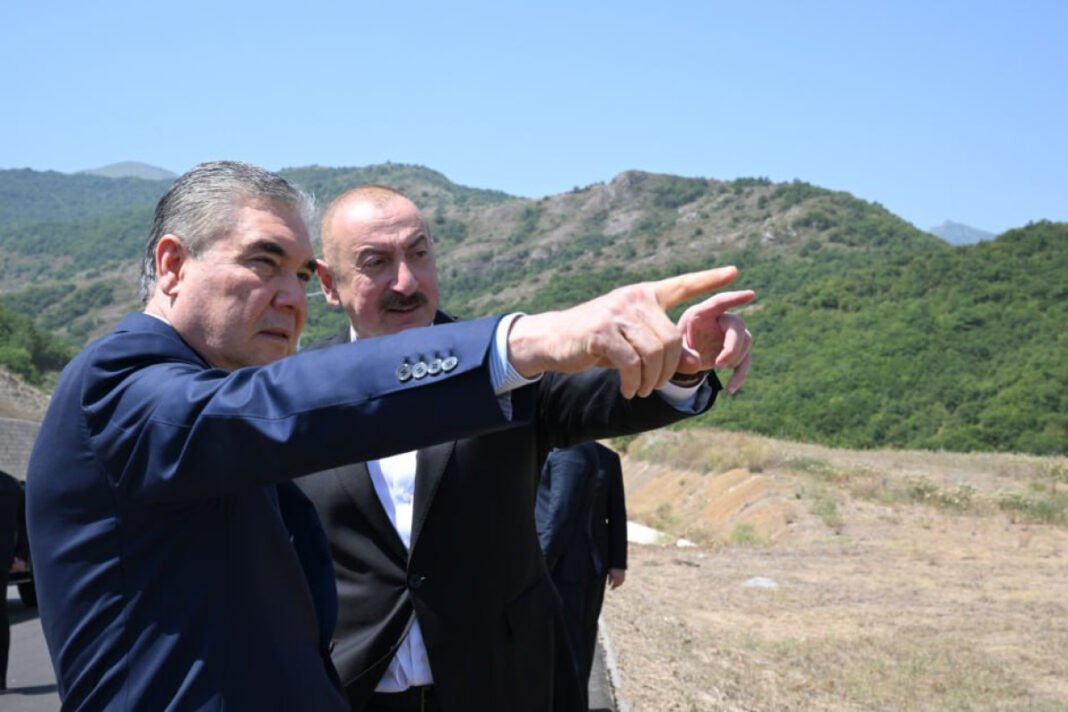By Vesti.Az
BAKU, July 17 — The visit of Gurbanguly Berdimuhamedow to Azerbaijan marks a potential turning point in Turkmenistan’s traditionally insular foreign policy. Historically, relations between Azerbaijan and Turkmenistan have been shaped by a complex geopolitical landscape across the South Caucasus and Central Asia, often strained by unresolved disputes over hydrocarbon fields in the Caspian Sea—most notably the Kapaz/Dostluk and Omar/Azeri fields. Although a Memorandum of Understanding on the joint development of the Dostluk field was signed in January 2021, bilateral ties remained stagnant, lacking real momentum toward deeper integration.
Turkmenistan’s long-standing policy of “positive neutrality” kept it at arm’s length from regional cooperation frameworks such as the Organization of Turkic States (OTS), where Azerbaijan plays a central role. In contrast, other Central Asian nations like Kazakhstan and Uzbekistan have strengthened ties with Azerbaijan, increasing trade by 15% and 12% respectively in 2024, according to ITC Trade Map data. This positioned them more effectively within the Middle Corridor—a key east-west transit route connecting China to Europe via the Caspian Sea, Azerbaijan, Georgia, and Turkey. Turkmenistan, however, missed out on these logistical and commercial gains.
Geopolitical Shift: A Visit with Strategic Implications
Berdimuhamedow’s current visit—featuring stops in Shusha and Khankendi, as well as high-level talks with President Ilham Aliyev—signals a recognition of Azerbaijan’s strengthened geopolitical standing following its victory in the 2020 Second Karabakh War. It also reflects Ashgabat’s reevaluation of its regional strategy. While Turkmenistan’s neutrality allowed it to maintain policy independence, it also hindered participation in emerging regional alignments and denied it access to growing markets and infrastructure initiatives.
This renewed engagement appears to acknowledge Baku’s increasing role as both a geopolitical anchor in the South Caucasus and a strategic transit hub for the wider Eurasian region. The visit indicates Turkmenistan’s interest in escaping its relative isolation and leveraging Azerbaijan as a bridge to European markets.
Turkmenistan’s Trade Landscape: Gas Dependency and Vulnerabilities
Turkmenistan’s economy remains heavily reliant on natural gas exports, which accounted for roughly 80% of its export revenues in 2024, according to the World Bank. The vast majority of that gas—approximately 60%—was exported to China via the Central Asia–China pipeline, leaving Ashgabat increasingly dependent on a single buyer known for dictating unfavorable pricing terms.
Prior to 2022, Russia also acted as an intermediary, purchasing Turkmen gas for re-export to Europe. But sanctions and geopolitical shifts curtailed this channel. Currently, Turkmenistan’s trade with Azerbaijan is modest—just $450 million in 2023, far below its trade volume with Kazakhstan ($2.1 billion) and Uzbekistan ($1.8 billion). While exports to Azerbaijan primarily include petroleum products, textiles, and chemicals, imports consist of machinery, food, and construction materials. However, infrastructure gaps and weak logistics continue to limit the growth of bilateral commerce.
Logistics and Energy: Reconnecting East and West
A key theme of the visit is energy and logistics cooperation. With the European Union eager to diversify its gas supplies, the Middle Corridor—stretching across the Caspian through Azerbaijan, Georgia, and Turkey—has re-emerged as a viable route for transporting Turkmen gas westward.
The long-discussed Trans-Caspian Gas Pipeline, dormant since the early 2000s, is once again on the table. Azerbaijan, already delivering gas to Europe via the Southern Gas Corridor (through TANAP and TAP), possesses both the infrastructure and experience to support such a project. In addition, Azerbaijan’s investments in port infrastructure—particularly the Port of Baku, which saw a 20% increase in cargo throughput in 2024—make it a natural logistics partner for Turkmenistan, whose port facilities in Turkmenbashi are in need of modernization to meet international trade standards.
Investment Potential and Regional Integration
Azerbaijan is actively expanding its investment footprint across Central Asia, having invested $300 million in logistics in Kazakhstan and $150 million in Uzbekistan’s agricultural sector in 2024. In contrast, Turkmenistan remains a more difficult investment environment due to its closed economy and bureaucratic hurdles.
However, Berdimuhamedow’s visit could serve as a catalyst for change. By inviting Azerbaijani investment—especially in its port and energy sectors—Turkmenistan may finally begin to tap into broader regional development trends. From the perspective of international relations theory, the visit illustrates both the dynamics of soft power and rational choice: Ashgabat, recognizing its peripheral position, is attempting to rebalance its foreign policy through targeted diplomacy.
For Azerbaijan, the strategy is clear: to act as a bridge between Central Asia and Europe, reinforcing its regional leadership through mutually beneficial partnerships. The concept of interdependence is increasingly relevant—deeper economic ties in logistics and energy can reduce the risks of future political fragmentation and promote regional stability.
A Strategic Pivot
Berdimuhamedow’s 2025 visit to Azerbaijan could mark the beginning of a new phase in Azerbaijani–Turkmen relations—one moving beyond cautious diplomacy to strategic partnership. With a focus on energy, transit, and investment, both countries have the opportunity to overcome historical disagreements and foster mutual trust.
If successful, this pivot may unlock new opportunities for trade and regional cooperation, while helping Turkmenistan diversify its economic partnerships and giving Azerbaijan further leverage as a key East–West connector in a shifting geopolitical landscape.


